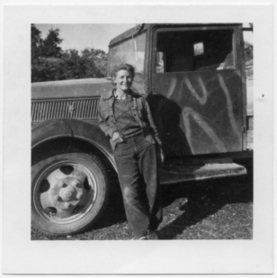 Evelyn Hutchins wurde 1910 in Snohomish, Washington/USA geboren. Ihre Eltern waren geschieden, beide waren politisch engagiert. Sie ging nach New York, um Tänzerin zu werden, doch zwang sie die wirtschaftliche Depression in verschiedene Jobs in zum Teil heruntergekommenen Clubs. Als der Spanische Bürgerkrieg ausbrach, folgte sie der Anwerbung des amerikanischen Medical Bureau und bewarb sich als Sanitätsfahrerin.
Evelyn Hutchins wurde 1910 in Snohomish, Washington/USA geboren. Ihre Eltern waren geschieden, beide waren politisch engagiert. Sie ging nach New York, um Tänzerin zu werden, doch zwang sie die wirtschaftliche Depression in verschiedene Jobs in zum Teil heruntergekommenen Clubs. Als der Spanische Bürgerkrieg ausbrach, folgte sie der Anwerbung des amerikanischen Medical Bureau und bewarb sich als Sanitätsfahrerin.
Evelyn Hutchins vor ihrem LKW, Abraham Lincoln Brigade Archives (ALBA), www.alba-valb.org (23.05.2016).
Ihr Anliegen wurde zunächst zurückgewiesen, doch schließlich setzte sie sich durch, diese typische „Männerarbeit“ verrichten zu dürfen. Hutchins transportierte zum einen Verletzte von der Front in Lazarette, mitunter aber auch Waffen. Die 26-Jährige erlangte einige Berühmtheit durch ihre lebensgefährliche Arbeit auf den Straßen nahe der Front, aber auch durch ihre mutige und humorvolle Art.
Nach ihrer Rückkehr in die USA wurde sie im Rahmen einer Studie über die Bedeutung der Angst in der Schlacht von dem Soziologen Dr. John Dollard von der Yale University interviewt, dessen Arbeiten noch während des Zweiten Weltkrieges Eingang fanden in die Ausbildung von Soldaten der US-Army. Sie beschrieb darin ihre Motivation, sich am Spanienkrieg zu beteiligen, folgendermaßen:
„[…] the important thing was that the fellows who understood why I wanted to be there, why I had taken the job of driving which was the only possibility of getting as close as I could to the actual fighting, they didn’t think a girl shouldn’t want to fight and have a machine gun instead of driving a car […] I always had to shift for myself and take care of myself and make my own decisions, and sometimes it would be tough on me. If that conditions you, I was conditioned. On the other hand I have always been very incensed at a lot of different injustices I have seen, and at the injustices I have seen against women.
[…] So far as the political situation in Europe, I am not like some people who think that all this stuff is just propaganda. […] I never felt that I was an outstanding genius, but people had to give me a chance to think and develop whatever thinkabilities I had. If a person would not give me a chance I would fight them. Hitler has the system where he sends women to camps to be breeders. That strikes me at my very most innermost desire for freedom, and self-expression, and for culture, and education. Just being an ordinary human-being I couldn’t tolerate a thing like that. It has gotten to mean so much to me that I don’t care what I do in the process of fighting against conditions like that.
I got the idea of going to Spain first and then my husband got the idea and my brother got the idea, and they got there ahead of me. And I worked so hard to go over there. I had saved money for it, I had to convince people. I had to argue with them, and to prove things. But the average fellow or my husband had no difficulty getting there. It might have helped that he was there. I don’t know... I went over there because I wanted to do a job.”
Literatur
-
Abraham Lincoln Brigade Archives, www.alba-valb.org
-
The complete interview can be found in John Dollard’s manuscript collection: ALBA Collection #122, Tamiment Library, New York University.
